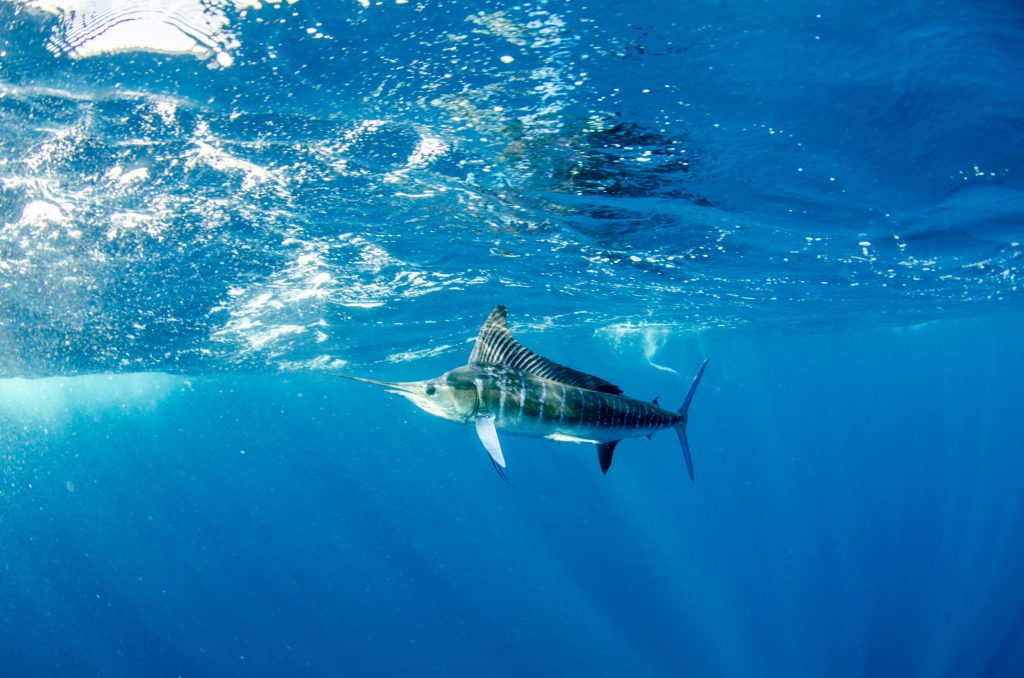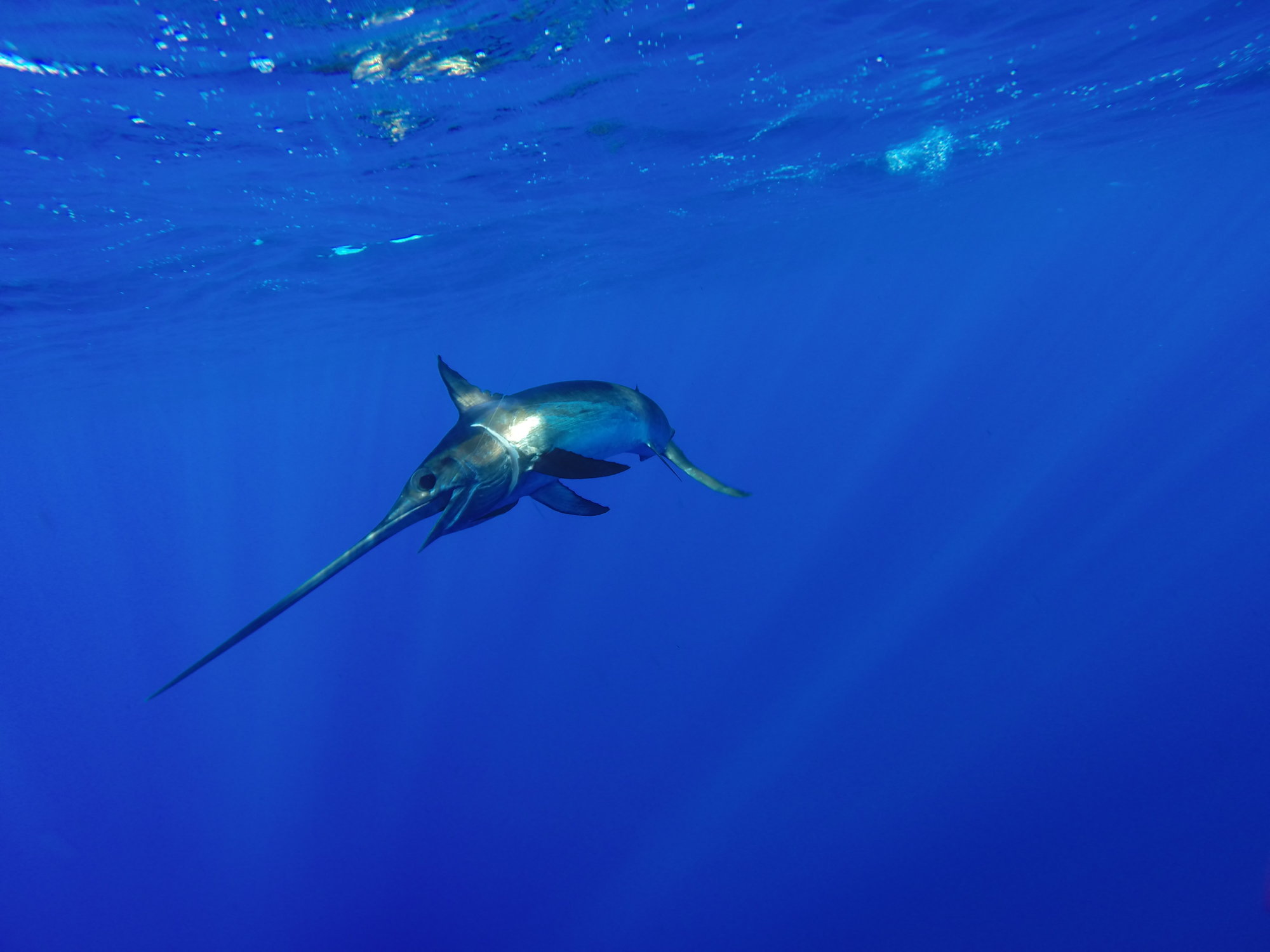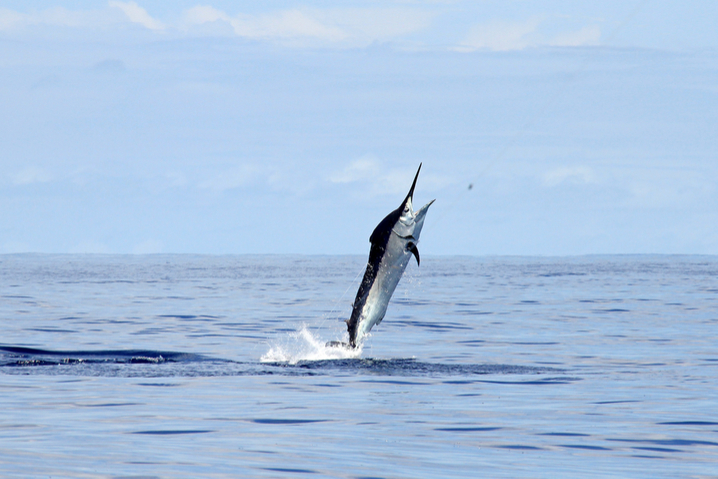How Fast Is The Sailfish
Reading Time: nine minutes
If you've ever had a Black Marlin, a Tarpon, or a Wahoo on the other stop of your line, you know how strong and fast these fish are. Have you lot e'er wondered – how fast? Or which i of these is the fastest fish in the body of water? We'll answer those questions and more in this list of the fastest creatures swimming the globe'due south waters.

Fish are a weird agglomeration of creatures, and at that place'south still and then much nosotros don't know most them. Whether they're swimming freely in the open up waters or tugging at your line, measuring their exact speed is a very hard thing to practise. Nevertheless, scientists and wildlife experts agree that these 10 fish are well-nigh likely to be the fastest fish in the sea. Allow's find out all almost them!
10. Tarpon
How fast? 35 mph (56 km/h)
Opening upward our list of the fastest fish in the ocean, Tarpon are some of the most beloved saltwater game fish in the entire earth. They're strong, stubborn, and put on a real acrobatic show. Their strength also increases their speed and they zip through the water at up to 35 miles per 60 minutes.

Tarpon like warm tropical and subtropical waters. Y'all can find them as far north as Long Island, south all the way down to Brazil, east to the ends of the Texas coastline, and west to the brinks of Africa.
"Silverish Kings" grow slowly and can live upwards to l years. They can reach lengths betwixt 4–eight feet and weigh betwixt 25–300 pounds. The majority of the fish anglers take hold of are usually between 25–eighty pounds. Matching their speed with their size, and adding acrobatics to this equation – you'll run into why Tarpon are a favorite freshwater game fish!
9. Bonefish
How fast? xl mph (64km/h)
Bonefish are the holy grail of flats line-fishing, especially if you're fishing on the fly. Information technology'south easy to empathize why. When nigh of usa think of speedy fish, our thoughts jump straight to Marlin and Sharks swimming out in the open waters. Merely imagine chasing around a fish swimming at 40 miles per hour in the flats! If that doesn't say adventure, and then nothing does.

Their hydrodynamic constitution allows Bonefish to attain 40 mph speeds and helps them escape from predators. They're likewise sensitive to noise and require a very subtle approach. Bones dearest sandy bottoms or grassy flats as shallow as half dozen inches.
You can find Bonefish in tropical and subtropical waters all around the earth. The highest concentrations of these fish are in the western Atlantic, from Nova Scotia to Brazil, including Bermuda, Turks and Caicos, and the Caribbean area Sea. You won't, withal, discover them in the Gulf of Mexico.
Bones don't grow also large, and their size also depends on where yous're looking for them. In Florida and the Bahamas, they boilerplate between four–6 pounds. If you become further south, into the West Indies, you'll discover Bonefish twice that size. The current Bonefish world record stands at over 16 pounds. Don't let their small size fool you, Bones are i of the feistiest saltwater competitors out there, and they'll fight you for every inch of your line.
8. Blueish Sharkdue south
How fast? 43 mph (69km/h)
The get-go Shark to make an appearance on our list is the Blue Shark. These lurkers dearest deep, cold waters where they tin swim freely at a whopping 43 miles per hour. Keeping in heed that these predators can abound upwards to 20 feet gives their speed a completely new dimension!

Blue Sharks can be institute throughout the world's oceans, and they've been spotted in many seas, including the Mediterranean. However, they rarely stop by the Baltic and Red Seas, or the Gulf of Mexico.
Blue Sharks seldom detect their identify on anglers' bucket lists. The reason for this is the fact that they live in very deep waters, meaning it takes some fourth dimension to reach them. In return, these trips usually aren't worth information technology. Blue Sharks aren't admired for their game qualities and are considered relatively like shooting fish in a barrel to catch.
Blues aren't among the most ambitious Sharks, still, according to Shark attack statistics, they are still relatively highly rated.
7. Atlantic Bluefin Tuna
How fast? 44 mph (70km/h)
Coming in at 44 miles per 60 minutes, Atlantic Bluefin Tuna is the fastest Tuna in the earth. Bluefin Tunas are too some of the tastiest fish you can catch. Wondering which tasty treats are made out of their flesh? Sushi and sashimi. However, due to overfishing, Bluefins are, unfortunately, now facing extinction.

The Atlantic Bluefin lives, every bit the proper noun suggests, throughout the Atlantic Ocean and in the Mediterranean Sea. They spawn during the summertime around the Balearic Islands and in the Gulf of Mexico. Ane of the best migratory spots in the United states is North Carolina, right off the coast of the Outer Banks.
These fish aren't only fast, they grow actually large too. Atlantic Bluefin can reach 12 feet in length and counterbalance i,500 pounds. It goes without saying that these fish are some of the feistiest fighters out there. They're well known for their sudden deep dives, and fast surface runs. To reel 1 in, you'll need a heavy tackle, a fishing belt, and some prior line-fishing experience.
Before y'all go out on the water to wait for these fighters, keep in mind that there are many preservation activities in identify to help go along Bluefins alive. Make sure to check angling regulations in the area yous're fishing in to avoid pain the fish population and earning yourself an unnecessary fine.
6. Mako Sharks
How fast? 46 mph (74km/h)
Not only are they the fastest Sharks in the ocean, but they're also the most highly evolved. Makos have the largest brain to torso ratio, their teeth are the sharpest, and they accept the widest array of temperatures they're tolerant to.

These predators are as scary as Sharks go. They don't hesitate to attack similar-sized prey, including Dolphins, Swordfish, and even other Sharks! Anglers love them because they put upwards a phenomenal fight, and they're very tasty, too.
Their average size is unremarkably between 6–10 feet, and they can weigh anywhere between 130–300 pounds. They tin can be found worldwide throughout tropical and temperate waters in depths of up to 500 feet. They commonly hang out in the offshore waters, but you might encounter a Shortfin Mako Shark closer to landmasses and in inlets.
Makos will put up a great fight, and they're known for long and fast runs, that are sometimes interrupted past spectacular jumps and flips. Notwithstanding, you should also proceed in mind that Makos are unsafe. They're known for attacking boats and leaping into them once hooked. This can crusade panic and impairment to the equipment and people on board.
5. Wahoo
How fast? 48 mph (77 km/h)
Wahoo's have a sharp gear up of teeth, a huge nib-type jaw, and speed only a few fish tin can match! Even though they put up a bang-up fight, anglers usually don't target Wahoo alone. More often, they're hooked while targeting other species. Withal, that doesn't hateful that fishers aren't happy to see Wahoo at the other terminate of their line, earning them a reputation for "the favorite bycatch" in large game line-fishing.

Their average size is ordinarily somewhere between 40–65 inches and xv–35 pounds. You can find them in tropical and warm temperate waters all around the world, including the Atlantic, Indian, and Pacific Oceans, the Gulf of United mexican states, the Caribbean area Ocean, and the Mediterranean Sea.
Getting a Wahoo to bite is the easy office of trying to catch one. They will eat just about anything, including live, dead, or strip baitfish such as ballyhoo and mullet. Once you hook them, the difficult office begins.
As soon as they bite, Wahoo will make a scorching fast initial run that can reel off hundreds of yards of line within a few seconds! While y'all effort to reel them in, they'll sometimes violently flare-up out of the water shaking their heads to endeavor and release from the hook, in the aforementioned way Billfish practise.
4. Striped Marlin
How fast? 50 mph (eighty km/h)
As well beingness among the fastest fish in the ocean, Striped Marlin are too known for putting on an aerial evidence for the anglers who try to grab them. They are easily recognizable by the beautiful stripes on the sides of their bodies. When they're excited, these stripes can turn to a brilliant violet color, which simply adds to their spectacular evidence.

You tin find Striped Marlin throughout the Pacific and Indian Oceans, from Eastern Africa to the westward of the Americas and as far southward as New Zealand. Some of the virtually prominent Striper fisheries are effectually Southern California, United mexican states, Costa rica, Hawaii, Australia, New Zealand, Ecuador, Peru, and the Galapagos Islands.
These fish are a lot smaller than their relatives, but they tin can still achieve a whopping 500 pounds in weight and 14 feet in length. Their size varies based on where you're looking for them, and you'll see a steady increase as you inch towards the equator.
Striped Marlin might not put upwardly the all-time fight out there, simply they are arguably one of the most spectacular fish y'all tin find in the world'southward waters. While you try to reel them in, they'll prove you lots of long runs, high leaps, tail-walking, and so much more than!
iii. Swordfish
How fast? 60 mph (94 km/h)
Next on our list of the fastest fish in the ocean is Swordfish. Compared to its feisty cousins, Swordfish is an often overlooked Billfish. It'south relatively hard to find Swordfish during chartered trips, which is why this fish is typically caught commercially by harpooning or longlining at great offshore distances.

If yous're ever lucky enough to come beyond a Swordfish on your angling journey, you'll learn why this fast fish is the ultimate big game claiming. To reel one in, you'll need some very good line-fishing skills, excellent bait brandish, avant-garde technique, and a lot of force.
Y'all can observe Swordfish anywhere in the Atlantic, Indian, and Pacific Oceans. It has the ability to preserve brain heat, meaning it's able to withstand a wide range of temperatures. Swordfish is one of the nigh highly migratory species, and it moves into warmer waters during the wintertime to spawn.
Its length averages between 4–vi anxiety and it usually weighs around 100 pounds. However, they can abound much bigger than this. The largest Swordfish ever caught came in at a whopping 14 feet and 1,182 pounds!
ii. Sailfish
How fast? 68 mph (110 km/h)
Coming in as the second-fastest fish in the ocean, this elegant creature volition tug your line at speeds of almost 70 miles per hour! The first signs of a Sailfish won't be it's impressive speed though, simply the sighting of a beautiful dorsal fin.

You tin can find Sailfish across tropical and subtropical zones of all oceans. If you're looking to hook 1, you'll find them in Florida, both on the Atlantic Coast and the Gulf of Mexico, Puerto Rico, Bermuda, Aruba, Curacao, Papua New Guinea, the Philippines, Hawaii, and many more beautiful spots around the earth.
They can reach lengths of up to 11 feet and weigh up to 220 pounds, but the most common catches are commonly betwixt 6–viii feet and between forty–60 pounds.
Like to its other relatives on our list, Sailfish is a very acrobatic creature. Information technology'll fight you for every inch of your line, showing a spectacular brandish of jumps and some trigger-happy head-shaking. The Billfish family unit is as well known for tail-walking which implies exactly what the name suggests – the fish skip across the surface of the water using only their tails.
ane. Black Marlin
How fast? 80 mph (129km/h)
Swimming at a speed of eighty miles per hour, Black Marlin is undoubtedly the fastest fish in the ocean! This isn't the only title that Blackness Marlin proudly wears. It'southward the king of the seas, and has a special place at the summit of every large game angler's bucket list. If angling was an Olympic sport, and then catching a Grander Black would be considered an achievement worthy of a gold medal!

Yous can observe Black Marlin throughout the Pacific and Indian Oceans. The nigh popular fishing hotspot for Grander Black is Australia's Great Barrier Reef, which is appropriately nicknamed the Mecca of Black Marlin angling. Another hotspots are Republic of mauritius, Hawaii, Costa rica, United mexican states, and Panama.
The largest Grander Black e'er caught was fifteen.iii anxiety in length and weighed 1,560 pounds, but their size usually averages betwixt 125 and 300 pounds. Having in listen their speed and size, it's no wonder why Grander Blacks are the ultimate catch!
Contrary to its relatives, Black Marlin won't waste its energy on leaps, tail-walks, and showing off! That's why a fight with ane is ordinarily much more intense. Blackness Marlin don't go tired easily, and it'due south more likely that ane will tire yous out. Catching a Black Marlin is the ultimate angling feel y'all can have and requires serious experience, preparation, and proper gear.
Fastest Fish in the Body of water: The Great 10
As you tin can run into, speed isn't the but quality these fish take. All of the species nosotros mentioned in this article are highly appreciated by both commercial and recreational fishermen for many different traits and qualities. However, when it comes to speed, these fish deserve all the bragging rights they tin get!
Now back to you… Accept you ever fished for one of the fastest fish in the sea? Which of these fish is most impressive to you? Allow the states know in the comments beneath!
How Fast Is The Sailfish,
Source: https://fishingbooker.com/blog/fastest-fish-in-the-ocean/
Posted by: becerrawituare.blogspot.com


0 Response to "How Fast Is The Sailfish"
Post a Comment